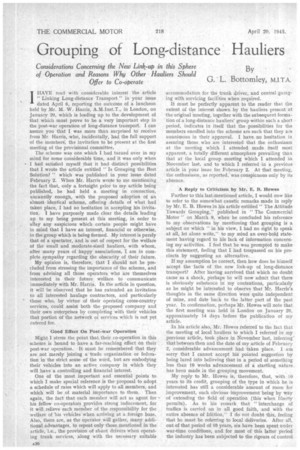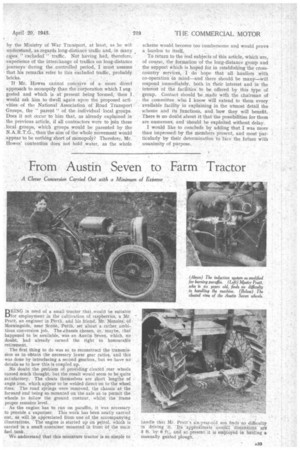Grouping of Long-distance Hauliers
Page 32

Page 35

If you've noticed an error in this article please click here to report it so we can fix it.
Considerations Concerning the New Link-up in this Sphere By
of Operation and Reasons Why Other Hauliers Should
Offer to Co-operate a L. Bottomley, M.I.T.A.
IHAVE read with considerable interest the article " Linking Long-distance Transport " in your issue dated April 6, reporting the outcdme of a luncheon held by Mr. M. W. Harris, A.M.Inst.T., in London, on January 20, which is leading up to the development of that which must prove to be a very important step in the post-war operation of long-distance transport. I can assure you that I was more than surprised toreceive from Mr. Harris, who, incidentally, had the full support of the -members', the invitation to be present at the first
meeting of the provisional committee. ,
The scheme was one which I had turned over in my mind for some considerable time, and it was only when I had satisfied myself that it had distinct possibilities that I wrote the article entitled " Is Grouping the Best Solution? " which was published in your issue dated February 2, When Mr. Harris wrote to me mentionffig the fact that, only a fortnight prior to my article being published, he had held a meeting in connection, uncannily enongh, with the proposed adoption of an almost identical scheme, offeringdetails of what had taken place, I had no hesitation in accepting his invitation. I have purposely made clear the details leading up to my being present at this meeting, in order. to allay any suspicions which certain people might have in mind that I have an interest, financial or otherwise, in the group which is being formed. My, interest is purely that of a spectator, and is out of respect for the welfare of the small and moderate-sized hauliers, with whom, after many years of happy associations, I am in complete sympathy regarding the obscurity of their future.
My opinion is, therefore, that I should not be precluded from stressing the importance of the scheme, and from advising all those operators who are themselves interested in their future welfare to communicate immediately with Mr. Harris, In the article in question, it will be observed that he has extended an invitation to all interested haulage contractors, and particularly those who, by virtue of their operating cross-country services, could assist both thefl proposed company and their own enterprises by completing with their vehicles that portion of the network of services which is not yet catered for.
Good Effect On Post-war Operation
Might I stress the point that their co-operation in this scheme is bound to have a far-reaching effect on their post-war operation. It must he remembered that they are not merely joining atrade organization or federation in the strict sense of the word, but are embodying their vehicles into an active company in which they will have a controlling and financial interest.
One of the most important and essential points to which I make special reference is the.proposal to adopt a schedule of rates which will apply to all members, and which will be of material importance to -them. Then again, the fact that each member will act as agent for his fellow co-operators provides strong inducement, for it will relieve each member of the responsibility for the welfare of his vehiCles when arriving at a foreign base. Also, there are, as the operator will gather, many additional advantages, to repeat only those mentioned in the article, i.e., the provision of shunt drivers when operating trunk services, along with the necessary suitable a30
accommodation .for the trunk driver, and central garag ing with servicing facilities when required, .
It must be perfectly apparent to the reader that the extent of the interest shown by the hauliers present at the original meeting, together with the subsequent forma' tion of a long-distance hauliers' group within such a short period, indicates in itself that the possibilities for the members enrolled into the scheme are such that they are unanimous in their approval. I have no hesitation in assuring those who are interested that the enthusiasm at the meeting which I attended made itself most apparent, a totally different atmosphere prevailing than that at the local group meeting which I attended in November last, and to which I referred in a previous article in your issue for, February 2. At that meeting, the enthusiasm, as reported,' was conspicuous only by its absence.
A Reply to Criticism by Mr.. E. B. Bowes
Further to this last-mentioned article, I would now like to refer to the somewhat caustic remarks made in reply by Mr. E. B. Howes in his article entitled" The Attitude Towards Grouping," published in "The Commercial Motor " on March 9, whenhe concluded his reference to my observations by mentioning that grouping is a subject on which " in his view, I had no right to speak at all, let alone write," to my mind an over-bold statement having regard to his lack of information concerning my activities. I feel that he was prompted to make this statement, feeling that I had trespassed on his precincts by suggesting an alternative.
If my assumption be correct, then how does he himself accept the facts of the new link-up of long-distance transport? After having survived that which no doubt came-as a shock, perhaps he will now admit that there is obviously substance in my contentions, particularly as he might be interested to observe that Mr. Harris's thoughts in the same direction were quite independent of mine, and date back to the latter part of the past year. In confirmation, perhaps Mr. Howes will note that the first meeting was held in London on January 20, approximately 14 days before the publication of my article.
In his article also; Mr. Howes referred to the fact that the meeting of local hauliers to which referred inmy previous article, took place in November last, inferring' that between then and the date of my article of February 2, considerable advancement had taken place. .I am sorry that I cannot accept his pointed suggestion by being lured into believing that in a period of something less than 10 weeks advancement of a startling nature has been made in the grouping movement.
My reply to Mr. Howes is, therefore, that, with 10 years to its credit, grouping of the type in which he is interested has still a considerable amount of room for improvement, such obvious improvement being by way of extending the field of operation (this when liberty permits). As to his remark that " interchange of traffics is carried on in all good faith, and With the entire absence of friction," I do not doubt this, feeling that he must be referring to local deliveries. After all, out of that period of 10 years, six have been spent under war-time conditions, and for most of this latter period the industry has been subjected to the rigours of control
by the Ministry of War Transport, at least, as be will understand, as regards long-distance traffic and, in many cases " excluded " traffic. Not having had, therefore, experience of the interchange of traffics on long-distance journeys during the controlled period, I must assume that his remarks refer to this excluded traffic, probably bricks.
If Mr. Howes cannot conceive of a more direct approach to monopoly than the corporation which I suggested and which is at present being -formed, then I. ' would ask him to dwell again upon the proposed activities of the National Association of Road Transport Groups, the " parent " of the individual local groups. Does it not Occur to him that, as already explained in
• the previous article, if all contractors were to join these • local groups, which groups would be parented -by the N.A.R.T.G., then the aim of the whole movement would appear to be nothing short of monopory? Therefore, Mr. Howes' contention does not hold water, as the whole scheme would become too cumbersome and would prove a burden to itself.
To return to the real subjects of this article, which are, of course, the formation of the long-distance group and the support which is hoped for in• establishing the crosscountry services, I do hope that all hauliers with co-operation -in mind—and there should be many—will respond immediately, both in their interest and in the interest of the facilities to be offered by this type of group. Contact should be .made with the chairman of the committee who I know will extend to them every available facility in explaining in the utmost detail the schethe and its functions, and how they will benefit. There is no doubt about it that the possibilities for them are numerous, and should be exploited without delay.
I would like to conclude by adding that I was more than impressed by the members present, and most particularly by their determination to face the future with unanimity of purpose.




















































